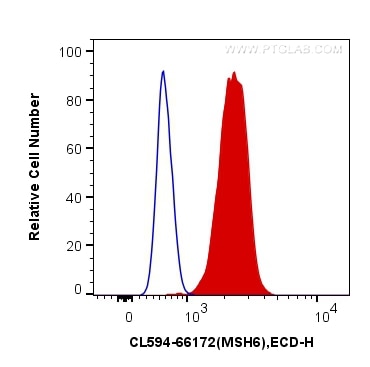Tested Applications
| Positive FC (Intra) detected in | HEK-293 cells |
Recommended dilution
| Application | Dilution |
|---|---|
| Flow Cytometry (FC) (INTRA) | FC (INTRA) : 0.40 ug per 10^6 cells in a 100 µl suspension |
| It is recommended that this reagent should be titrated in each testing system to obtain optimal results. | |
| Sample-dependent, Check data in validation data gallery. | |
Product Information
CL594-66172 targets MSH6 in FC (Intra) applications and shows reactivity with human samples.
| Tested Reactivity | human |
| Host / Isotype | Mouse / IgG2a |
| Class | Monoclonal |
| Type | Antibody |
| Immunogen |
CatNo: Ag12645 Product name: Recombinant human MSH6 protein Source: e coli.-derived, PET28a Tag: 6*His Domain: 1-400 aa of BC004246 Sequence: MSRQSTLYSFFPKSPALSDANKASARASREGGRAAAAPGASPSPGGDAAWSEAGPGPRPLARSASPPKAKNLNGGLRRSVAPAAPTSCDFSPGDLVWAKMEGYPWWPCLVYNHPFDGTFIREKGKSVRVHVQFFDDSPTRGWVSKRLLKPYTGSKSKEAQKGGHFYSAKPEILRAMQRADEALNKDKIKRLELAVCDEPSEPEEEEEMEVGTTYVTDKSEEDNEIESEEEVQPKTQGSRRSSRQIKKRRVISDSESDIGGSDVEFKPDTKEEGSSDEISSGVGDSESEGLNSPVKVARKRKRMVTGNGSLKRKSSRKETPSATKQATSISSETKNTLRAFSAPQNSESQAHVSGGGDDSSRPTVWYHETLEWLKEEKRRDEHRRRPDHPDFDASTLYVPE Predict reactive species |
| Full Name | mutS homolog 6 (E. coli) |
| Calculated Molecular Weight | 153 kDa |
| GenBank Accession Number | BC004246 |
| Gene Symbol | MSH6 |
| Gene ID (NCBI) | 2956 |
| RRID | AB_2919958 |
| Conjugate | CoraLite®594 Fluorescent Dye |
| Excitation/Emission Maxima Wavelengths | 588 nm / 604 nm |
| Excitation Laser | Yellow-Green Laser (561 nm) |
| Form | Liquid |
| Purification Method | Protein A purification |
| UNIPROT ID | P52701 |
| Storage Buffer | PBS with 50% glycerol, 0.05% Proclin300, 0.5% BSA, pH 7.3. |
| Storage Conditions | Store at -20°C. Avoid exposure to light. Stable for one year after shipment. Aliquoting is unnecessary for -20oC storage. |
Background Information
MSH6, also named as DNA mismatch repair protein Msh6 or GTMBP, is a 1360 amino acid protein, which contains one PWWP domain and belongs to the DNA mismatch repair MutS family. MSH6 localizes in the nucleus and is a component of the post-replicative DNA mismatch repair system. Msh2 and Msh6 form a protein complex required to repair mismatches generated during DNA replication.
Protocols
| Product Specific Protocols | |
|---|---|
| FC protocol for CL594 MSH6 antibody CL594-66172 | Download protocol |
| Standard Protocols | |
|---|---|
| Click here to view our Standard Protocols |




